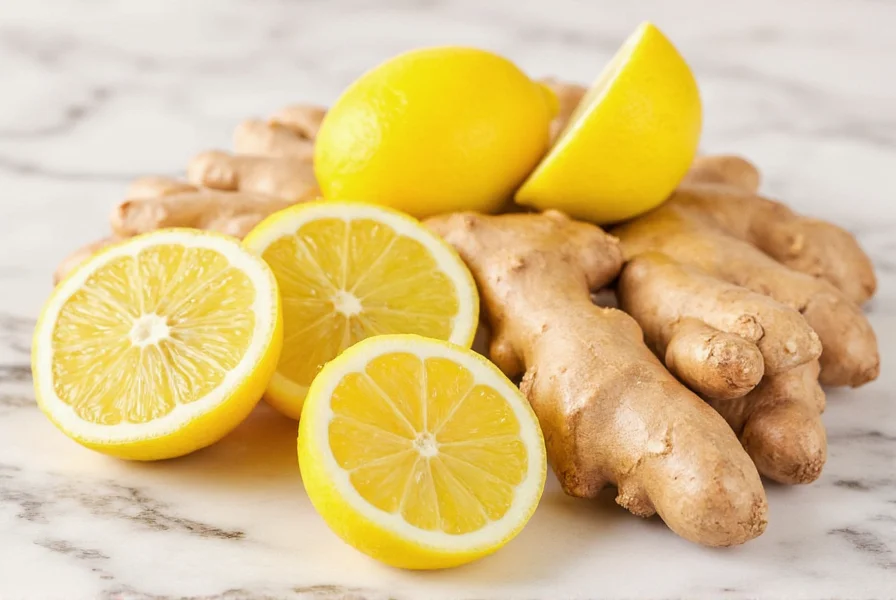The Science-Backed Benefits of Ginger and Lemon
For centuries, cultures worldwide have utilized ginger and lemon for their therapeutic properties. Modern research now provides evidence for many traditional uses while debunking exaggerated claims. Understanding what these ingredients actually do—and don't do—is essential for making informed health decisions.
Nutritional Profiles: What Makes This Combination Special
Ginger and lemon each bring unique nutritional components to the table. Ginger's active compound, gingerol, gives it potent anti-inflammatory and antioxidant effects. Lemon contributes significant vitamin C, flavonoids, and citric acid. When combined, they create a synergistic effect that enhances bioavailability of certain nutrients.
| Component | Ginger (per 100g) | Lemon (per 100g) |
|---|---|---|
| Vitamin C | 5mg | 53mg |
| Antioxidants | Gingerols, shogaols | Hesperidin, diosmin |
| Key Minerals | Magnesium, potassium | Potassium, calcium |
| Active Compounds | Gingerol (anti-inflammatory) | Citric acid (alkalizing) |
Evidence-Based Health Benefits
Research supports several specific benefits of ginger and lemon consumption. A 2020 meta-analysis published in Nutrients confirmed ginger's effectiveness in reducing nausea and vomiting, particularly for pregnancy-related morning sickness and chemotherapy-induced nausea. The European Medicines Agency recognizes ginger as a traditional remedy for digestive issues.
Lemon's vitamin C content supports immune function, though it won't prevent colds as commonly believed. However, regular vitamin C intake may reduce cold duration by 8% in adults and 14% in children according to Cochrane reviews. The combination of ginger's anti-inflammatory properties and lemon's antioxidants creates a powerful duo for reducing oxidative stress.

Digestive Health Support
Ginger and lemon for digestion represents one of the most scientifically supported uses. Ginger stimulates saliva, bile, and gastric enzyme production, accelerating gastric emptying. A study in the World Journal of Gastroenterology found ginger reduced symptoms of functional dyspepsia. Lemon's citric acid helps break down food and may prevent constipation by increasing water content in the gut.
Inflammation Reduction
Chronic inflammation underlies many health conditions. Ginger's gingerol inhibits inflammatory pathways similar to non-steroidal anti-inflammatory drugs (NSAIDs), but without the side effects. Research in Arthritis demonstrated ginger extract reduced knee pain in osteoarthritis patients. Lemon's flavonoids complement this effect by reducing oxidative stress markers.
Common Misconceptions About Ginger Lemon Water
Despite popular claims, ginger and lemon water benefits for weight loss remain largely unsupported by rigorous research. While staying hydrated supports metabolism, no evidence shows this specific combination causes significant fat loss. Similarly, claims about "detoxifying" the body misrepresent how human physiology works—the liver and kidneys naturally detoxify without special drinks.
Does ginger and lemon help with weight loss? It may indirectly support weight management by replacing sugary beverages and potentially reducing appetite, but it's not a magic solution. A systematic review in Complementary Therapies in Medicine found minimal direct weight loss effects from ginger supplementation alone.
How to Prepare Ginger Lemon Water Properly
For maximum benefits, proper preparation matters. Many people make ginger lemon tea benefits less effective by using improper techniques. Here's the science-based method:
- Use fresh, organic ingredients when possible
- Peel 1-inch ginger piece and slice thinly (peeling removes some beneficial compounds but reduces potential pesticide exposure)
- Add to 8-12 ounces of hot (not boiling) water (170-185°F preserves more active compounds)
- Steep for 5-10 minutes
- Add juice from half a lemon after steeping (heat degrades vitamin C)
- Optional: Add a small amount of honey for taste if desired
This preparation method maximizes gingerol extraction while preserving lemon's vitamin C content. Consuming this beverage in the morning may support digestion throughout the day, though benefits aren't limited to morning consumption.

Safety Considerations and Potential Interactions
Ginger and lemon are generally safe for most people, but certain precautions apply. Ginger may interact with blood thinners like warfarin, potentially increasing bleeding risk. Those with gallstones should consult a doctor before consuming large amounts of lemon due to its citric acid content.
Excessive ginger consumption (more than 4 grams daily) may cause heartburn or mouth irritation. Lemon's acidity can erode tooth enamel over time—drink through a straw and rinse mouth with plain water afterward. Pregnant women should limit ginger to 1 gram daily unless approved by their healthcare provider.
Practical Applications Beyond Beverages
The ginger and lemon combination extends beyond simple drinks. Culinary applications include:
- Marinades for fish or chicken (the acids tenderize proteins)
- Salad dressings with olive oil and a touch of honey
- Stir-fry sauces that enhance flavor without excess sodium
- Smoothie boosters for added nutrition
For those seeking ginger lemon immune system support during cold season, incorporating both ingredients into soups and broths provides warmth and potential symptom relief without the sugar content of commercial remedies.
Conclusion: A Balanced Perspective on Ginger and Lemon
Ginger and lemon offer genuine health benefits supported by scientific research, particularly for digestion and inflammation reduction. While not miracle cures, they represent valuable components of a healthy diet when used appropriately. The most effective approach combines these ingredients with other healthy lifestyle practices rather than relying on them as standalone solutions.
When preparing ginger lemon water benefits, focus on proper preparation techniques to maximize the bioactive compounds. Remember that no single food or drink can compensate for an otherwise poor diet—these ingredients work best as part of a varied, nutrient-dense eating pattern.
Does ginger and lemon really help with weight loss?
Research shows minimal direct weight loss effects from ginger and lemon alone. Any benefits likely come from replacing sugary beverages and supporting hydration. A systematic review found ginger supplementation produced only modest weight reduction when combined with diet and exercise.
How much ginger and lemon water should I drink daily?
Most studies use 1-2 grams of ginger daily (about 1-inch piece). For lemon, half to one whole lemon per serving is typical. Consuming 1-2 cups daily provides benefits without excessive acidity or potential side effects. Always consult your healthcare provider if you have specific health conditions.
Can I drink ginger lemon water on an empty stomach?
Yes, many people drink ginger lemon water first thing in the morning to stimulate digestion. However, those with acid reflux or sensitive stomachs may experience discomfort. If you have gastrointestinal issues, start with small amounts and monitor your body's response.
What's the best time to drink ginger lemon water?
Morning consumption may support digestion throughout the day, but benefits aren't time-dependent. Some prefer it before meals to stimulate digestive enzymes, while others enjoy it in the evening for relaxation. Consistency matters more than specific timing for most health benefits.
Are there any drug interactions with ginger and lemon?
Ginger may interact with blood thinners like warfarin, potentially increasing bleeding risk. It might also lower blood pressure, so monitor if taking hypertension medication. Lemon generally has few interactions, but its acidity could affect absorption of certain medications. Always consult your healthcare provider about potential interactions with your specific medications.
Additional Reading
For those interested in evidence-based nutrition information, the National Institutes of Health Office of Dietary Supplements provides reliable resources on ginger and citrus fruits. Peer-reviewed journals like Complementary Therapies in Medicine and Journal of Medicinal Food publish ongoing research on these natural ingredients.











 浙公网安备
33010002000092号
浙公网安备
33010002000092号 浙B2-20120091-4
浙B2-20120091-4